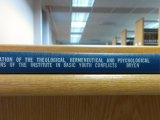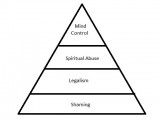 The Apostle Paul always seemed to know his audience. In writing to the Galatians, he challenged the way in which they were over-selling the law and under-selling the Gospel — a move that paved the way for rampant legalism. Meanwhile in Corinth, Paul was faced with the other end of the spectrum, an under-appreciation for the law that led to outright antinomianism and licentiousness. Yet at both ends of the spectrum, whether Paul is calling the Galatians to true faith or the Corinthians to true obedience, he finds the same point to be essential:
The Apostle Paul always seemed to know his audience. In writing to the Galatians, he challenged the way in which they were over-selling the law and under-selling the Gospel — a move that paved the way for rampant legalism. Meanwhile in Corinth, Paul was faced with the other end of the spectrum, an under-appreciation for the law that led to outright antinomianism and licentiousness. Yet at both ends of the spectrum, whether Paul is calling the Galatians to true faith or the Corinthians to true obedience, he finds the same point to be essential:
“For in Christ Jesus neither circumcision nor uncircumcision has any value. The only thing that counts is faith expressing itself through love..” (Galatians 5:6: see also Galatians 6:15).
“Circumcision is nothing and uncircumcision is nothing. Keeping God’s commands is what counts.” (1 Corinthians 7:19)
Paul was focusing his readers beyond the externals and religious rites to the heart of the gospel: a faith in Christ resulting in a new creation (Galatians 6:15, 2 Corinthians 5:17). The issue at hand was circumcision, and Paul and the rest of the early church bore out this adiaphora understanding in their actions. Paul saw no need to circumcise the Greek Titus (Galatians 2:3) despite his conversion. And when the early church gathered for its first church council in Jerusalem (Acts 15) — with this topic as the main agenda — their conclusion was clearly that the sign of circumcision as a Christian ‘rite of passage’ would place an unnecessary burden on the new Greek believers.
I am grateful that Mr. Gothard has taken the time on his web site to clarify his position on circumcision. There he states, “Circumcision is certainly not required for salvation or for achieving righteousness as a believer.”[1] However, the Institute of Basic Life Principles (IBLP) printed materials still draw a moral line in the sand for believers, stating that “The attack against circumcision in the United States coincided with the revolt against authority and morality in the 1960’s” and that “the term uncircumcised is synonymous with immoral men.”[2] These materials also conclude that “uncircumcised men have been more promiscuous than circumcised men,” and that even today there is a strong link between circumcision and moral purity.[3] The conclusion, in no uncertain terms, is that “Because this is one subject which is so strongly commanded and reinforced in Scripture, there is no question what the decision of Christian parents should be on the matter.”[4] A suggested ceremony, and a certificate suitable for framing, are included in the materials.
In the end, the issue isn’t ‘to circumcise or not to circumcise.’ I raise the topic of circumcision to address a broader, more methodological issue — namely, the general tendency of IBLP’s system of doctrine to ‘add unnecessary burdens’ to believers. Over the years, both in print and verbally at IBLP seminars and ATI conferences, Gothard has made dogmatic moral assertions into every conceivable realm of life. A true believer will rid their homes of idolatrous Cabbage Patch Kids which, by enacting a written agreement to love a doll, violates the First Commandment.[5] A true believer will not listen to music that places a downbeat accent on beats 2 and 4; it is “the antithesis of what God desires in the life of a Christian.”[6] A godly heart will not only avoid movie theaters, but is duty-bound to confront those who visit these “places of worldly amusement.”[7] IBLP and ATI attendees are instructed on the proper moral length of men’s hair, the anathema of blue jeans or skirts with slits, and the dangers of frivolous conversation with the opposite sex.
Much could be said about these and other regulations, and I will leave it to others to delve deeper. But the tragedy of these restrictions is that they create an alternate trajectory for spirituality. Like the Judaizers who taught the Galatians “after beginning with the spirit” to continue their Christian walks “by human effort” (Galatians 3:3), these extra-biblical moral restrictions for holy living replace the power of the gospel for the same goal. Paul states it directly to the Colossians, in a verse extremely relevant to the topic of ‘Basic Principles’: “Since you died with Christ to the basic principles of this world, why, as though you still belonged to it, do you submit to its rules: “Do not handle! Do not taste! Do not touch!”? These are all destined to perish with use, because they are based on human commands and teachings. Such regulations indeed have an appearance of wisdom, with their self-imposed worship, their false humility and their harsh treatment of the body, but they lack any value in restraining sensual indulgence.” (Colossians 2:20-23)
“For in Jesus Christ neither long hair nor short hair, neither rock nor Bach, neither penny-loafer nor flip-flop, has any value. The only thing that counts is faith expressing itself through love.” Piling up a list of extra-biblical rules, with the inference that serious believers will be wise to follow them, replaces the burden Christ has lifted with an entirely new burden, that of moral conformity to earn the smile of God. Sanctification becomes a list of human-effort do’s-and-don’ts rather than — first and foremost — an encounter with a lavish savior and a friend of sinners, in whom I am already at the pinnacle of God’s acceptance.
Stated in the positive, the same gospel that justifies also sanctifies. In other words, putting our faith in the death and resurrection of Christ isn’t just the intro-level prerequisite course that gets our foot in the door, so that we can graduate to the advanced classes. Our growing maturity in the Christian faith doesn’t play by a different set of rules. The new birth and the new life are both gospel-driven. In practical terms, this means that every morning I live my life in Christ by placing my trust, all over again, in the amazing grace of my faithful Lord. This reminder is not meant to be an indictment on Bill Gothard; it is meant to be a challenge to my own heart, which so often forgets that the goal of my life is not to impress God with my obedience, but to rest each moment in the completed work of Christ.
I believe that the IBLP movement is a well-intended movement, and that Mr. Gothard has been motivated in his teachings by a desire to help others in living out the Christian life. But amazingly, Paul tolerated bad motives (see Philippians 1:15-18) if the gospel was kept pure. The converse was not true. His concern was that the beauty of gospel freedom not be maligned by adding anything to it. It needs no sequels.
The gospel that saves and the gospel that sanctifies have the same formula: Jesus plus nothing. The many regulations of the IBLP materials may have “an appearance of wisdom” but ultimately they “lack any value in restraining sensual indulgence” and gloss over the stunning acceptance that is already ours in Christ by faith. The good news is far better than we imagine.
[1] http://billgothard.com/news/circumcision
[2] Basic Care Bulletin: How to Make a Wise Decision on Circumcision, p. 2.
[3] Ibid., p. 6.
[4] Ibid., p. 2.
[5] http://www.pfo.org/bgothard.htm, referencing an IBLP letter from 1986.
[6] Advanced Seminar Textbook, p. 133.
[7] Journey to the Heart: Discover Marvelous Rewards by Experiencing the Greatest Commandment!
© 2007, p. 18.






















[...] More from Google Blogs]: Circumcision, Blue Jeans, & Cabbage Patch Kids: The Dangers of … [...]
Kevin, what a great piece. Thank you! I remember the first time I noticed the verses in Colossians about "do not handle, do not taste, do not touch." A conversation with some ATI friends was fresh in my mind. They were making a big deal out of only wearing striped or spotted ties, considering these to be more "conservative." When I read these verses it just hit me how completely useless our made-up rules were for bringing heart change.
I don't know how you managed to squeeze so much into this but your thoughts about trying to continue the Christian walk in human effort after having begun in the Spirit, effectively replacing the Spirit with human effort - those are some of the same thoughts that have completely changed my life.
Excellent, Kevin! Thanks for writing this!
"neither rock nor Bach"
Love it!
LOVED it Kevin!! I have just started rereading Galations (NOT in KJV (o:) and this article really reiterated what I've been thinking about all morning. Thank you!!
Excellent!
Ran across this quote from Spurgeon and thought of this piece: "It is the Lord who has begun the good work within us; it is He who has carried it on; and if he does not finish it, it never will be complete. If there be one stitch in the celestial garment of our righteousness which we are to insert ourselves, then we are lost; but this is our confidence, the Lord who began will perfect. He has done it all, must do it all, and will do it all. Our confidence must not be in what we have done, nor in what we have resolved to do, but entirely in what the Lord will do."
What a comforting thought, Matthew. Our only hope in life and in death!
Wow! What a great quote!
well said!
Love it. Keep it up, keep thinking, and keep finding little idols we hide in our choir robes.
Very true. I love your quote, "The gospel that saves and the gospel that sanctifies have the same formula: Jesus plus nothing." This sounds a lot like what one of my favorite seminary professors often said, "the method of justification always determines the method of sanctification - by grace alone through faith alone..." ~ Dr. Stanley Toussaint. :-) Thanks for the reminder!
incredible
Excellent overview. Wish I could get these two things across to the church I'm in now: 1) “For in Jesus Christ neither long hair nor short hair, neither rock nor Bach, neither penny-loafer nor flip-flop, has any value. The only thing that counts is faith expressing itself through love.” 2)"The gospel that saves and the gospel that sanctifies have the same formula: Jesus plus nothing."
I love the last paragraph about the importance of the gospel not being diluted. Powerful!
Thank you for articulating so well and so respectfully what many of us have had to struggle through. Wanting to seek, please, and honor the Lord has involved so many in this burden-bearing. But His yoke is easy. This is why we must argue these issues.
"Jesus plus nothing"~~ LOVE IT!
The apostles Peter and Paul probably would have had little to do w/Gothard.
In fact they would've said things like:
"...why do you test God by putting a yoke on the neck of the disciples which neither our fathers nor we were able to bear? ...Are you so foolish? Having begun in the Spirit, are you now being made perfect by the flesh?"
It's a good thing that we all know who we should really listen to. ;o)
Great article.
However, believers need to keep the balance of liberty. At the same time that leaders are unwise to dogmatically tell other Christians across the board what specific standards they are to hold, so it seems unwise to generally give other believers license to do whatever as long as they are not directly violating Scripture teaching. The same apostle that warned of the dangers of teaching "do not handle, do not taste, do not touch" also admonished believers to avoid stumbling new believers and to be transformed.
There are cultural standards and stigmas that tend to take away from our witness as believers in America as with any culture. Generally, becoming like the world in dress and language is a stumbling block to our witness. If I cover myself with skull tattoos and start using curse words, I will likely turn people away from the sanctified life in Christ that I claim to be pursuing as a believer.
Paul reminded believers to do all to the glory of God. As long as we seek to glorify God in our choices, we will be able by his grace to walk in love and holiness.
Tim, the early church wrestled with the same question: Where is the balance between legalism and license? Well, the truth is that we are not meant to live in a balance between legalism and license, because grace transcends both. In Acts 15, the church elders concluded that they would put upon the believers no other burden, than about three moral laws contained right there in the text. Anything else that you had a question about, could be run through a filter of Jesus' law of love, and obviously every person may come to a different conclusion after using this "filter". I see no need to lay upon modern-day believers more than what Acts 15 does.
Thanks Tim. There are two sides to this pendulum, legalism and license, which we can see played out in the churches at Galatia and Corinth, as I mentioned in the intro. Gothard's teaching rose out of a reaction to the license of the 60's 'Jesus movement' and swung hard to the legalistic side. It would be dangerous, years later, to react to Gothard's legalism by swinging far to the antinomian side. But in BOTH cases Paul made it clear not to gauge the Christian life by the externals.
I think the word 'extra-biblical' is important here. Rules that claim God's authority, but aren't clear from the biblical text, create a sort of New Testament Talmud. Some rules for holy living are clearly taught in Scripture (you mention cursing and I think that's one of these, having been addressed in James 3, etc.). But others are not so obvious (I would even lump the tattoos, and the subjectivity of clothing styles, into that list) and we should be careful not to give them the weight of 'thus saith the Lord.' But I agree with you that we must keep a balance between the wonderful liberty of the gospel and a desire for obedience that means depending on the Holy Spirit to walk in Christ's steps, moving in step with our Savior.
"Gothard's teaching rose out of a reaction to the license of the 60's 'Jesus movement' and swung hard to the legalistic side"
As someone who grew up in the 60's--both the Jesus movement and Gothard were reactions to the wild side of the 60's- question authority, hippies, drugs, free sex, etc. The difference was the Jesus movement did not require that you clean up and shave after you became a Christian. It only required that you seek His will for your life.
Thanks, Kevin, for that wonderful article. It was beautifully written.
In reading the discussion between you and Tim, I remembered something I pointed out to my daughter from scripture just yesterday. The Bible never said that people would know we belonged to God by our outward appearance. It did say that the world would recognize us by our love for each other. Not the warm fuzzy make-me-feel-good emotion that is often called love, but the hard-working love the God extends to us. The love that took Jesus to the cross.
We should not be afraid of grace. Grace does not bring license to sin, but rather freedom to live. God's grace balances our lives. We do not have to qualify the gospel with our additions to keep people from "going too far" in grace. God is sufficient to train and direct His children. The scripture warns against adding to God's word.
Again, thank you so much for your insight. I have really been enjoying these discussions.
[...] Gothard continues the letter by making some rather bizarre assertions about the need to hold “higher standards” because our disciples look to us for an example. He goes so far as to say that “our disciples…will motivate us to maintain a higher standard.” While it is true that we as believers must walk worthy of our calling in Christ, Gothard’s focus here is on outward appearances. As we disciple others, one of the first things we should be teaching them is that God looks upon the heart (1 Samuel 16:7), not the goodness of our outward appearances. The call upon a Christian disciple is not ultimately one of keeping higher standards; God calls us to a life-transforming relationship with Him as we live by the power of the Holy Spirit. Anything else is simply guilt-based legalism or a “Jesus+” theology. [...]
I did not grow up ATI but married an ATI girl, and I am grateful for the way she was raised. She loves the Lord and was taught purity and modesty. I have a great relationship with her parents beacuse of courtship and I married a woman that most American men only dream of.
You mean, you married a serf or a slave or a child? Say what you mean.
Yeah, your right Jencendiary. I married me a slave. She waits for me at the door with a kiss everyday at 5:15 sharp, when I get home from work. Then she obediently cooks dinner to my utmost specification. Afterward, with a glow in her eyes, she sits at my feet as I wash her in the water of the Word. Of course she has a dress on the entire time and her hair and makeup are absolutely perfect. This is all after a wonderful day of instructing our toddlers to be obedient and to, of course, honor daddy - you have no freakin' clue what a jewel I married, and perhaps you should think twice before hitting the "add comment" button. This is, after all, my wife you are referring to.
I think its awesome that you stuck up for your wife here. I have a good friend who is.. hm.. sort of ATI (though no strange rules about cabbage patch dolls or anything) and she is too a gem. I don't mind people pointing out the teachings, but when they attack the people and resort to name calling, well, that is just wrong.
So the Holy Spirit is incapable of working a good relationship between you and your wife, and you and your in-laws without the 'saving grace' of an ATI background? Yes, you could give a certain amount of credit to a wholesome upbringing, but based on everything I've seen and heard from ATI, and experienced myself, the only good that comes out of it is when God directly leads and intervenes, and sometimes parents really stand in the way of that.
It is the Almighty goodness of God (not ATI) that has lead me to Christ, and living what I hope is a righteous life before God. In fact, I nearly committed suicide in my desperation to leave ATI. God pulled me out of it. I'm glad you and your wife had a great experience. Few others did.
Heather, your assessment is correct, ours was lead by the Lord and not by a "courtship model" or whatever. After spending some time on this website and reading some rather frightening accounts, I do recognize how fortunate I am. I suppose out of ignorance I gave ATI more credit than warranted.
Thank you for your response. I've seen you post many other places on this site, and I think I see where your heart really is, I suppose this last comment just really rubbed me raw. I'm very glad to see that you see where the rest of us are coming from. Thanks!
I love how having a doll is idolatrous but pledging allegiance to the flag isn't.
I think that is an interesting point Isaac. I think the whole doll thing is obviously ridiculous, but I actually don't pledge allegiance to the flag. It just feels weird to me and I grew up in a fairly non-legalistic church. I know a whole lot of people who are horrified by that but to each their own.
I worked in retail the Christmas when Cabbage Patch Dolls were new and people were searching for them. I also remember being at an IBYC seminar and hearing the "spiel" about them and just thinking "they're a toy, they can't be possessed." Your articles are giving me more insight. I never read the literature from the Institute and discarded it many years ago. This sounds like a grave misrepresentation of Jesus and the Christian faith.
Isaac,
Pledging allegiance to the (a) flag isn't idolatrous in and of itself. It's obviously a symbol of something bigger than a piece of cloth. Perhaps someone people are worshiping an actual flag, but I dare say more people aren't.
It's no different than someone saying "..I'll cherish the old rugged cross.." They aren't interested in a piece of wood, it's what it represents.
[...] Heresy is a word to be used with caution. Certain doctrines of Christianity are non-negotiable, but many have a little wiggle room for disagreement (if not a lot). That’s why we have so many denominations within Christendom. However, Bill “inoculates” his followers from “outsiders” by suggesting their theology is formed to justify indulgence in some type of sinful behavior. This seems a little below the belt…especially if the issue contested is something like rock music or blue jeans. [...]
[…] begun to unfold, and this involves a lot more than the possibility of Gothard secretly playing with Cabbage Patch dolls. Over the last couple of years, a number of home schooled girls that grew up under the authority of […]
This is excellent! I've said for a long time that Paul would never be allowed to preach in ATI and IFB circles.
Kevin, I would love to know where in NC your church is located so we could maybe visit. We're in Winston-Salem/Greensboro area a lot when we're in the states.
Hi Lori! I am on the pastoral staff of a PCA church in Charlotte. Here's more info: www.stonebridge.org. Come by to visit us sometime!
[…] Dangers of “Jesus+” Theology […]